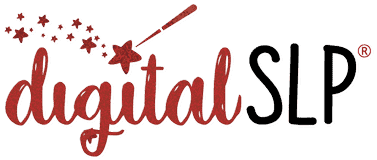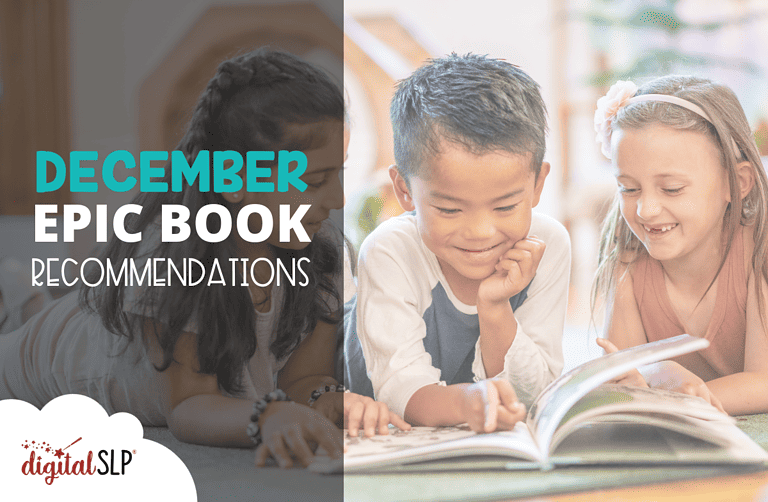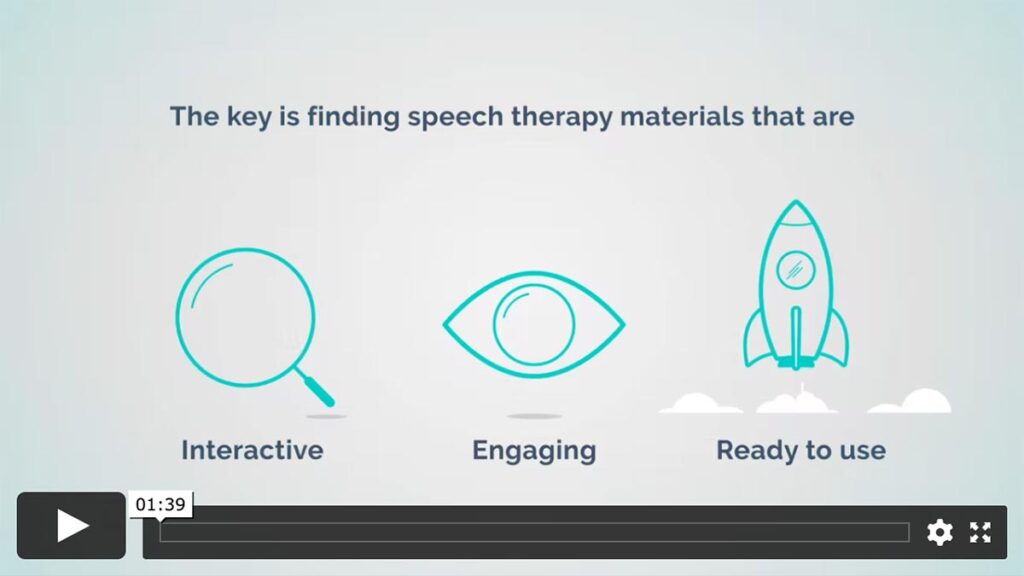This Epic book post is bittersweet, because it’s the final one! I have loved bringing you these recommendations each month, and I hope you’ll revisit them whenever you need some inspiration.
In 2024, I’ll be starting a new monthly blog series focusing on videos to use in speech therapy sessions. I’m looking forward to that, but for now, let’s dive into one last set of book suggestions!
December 1st is Rosa Parks Day, commemorating her landmark refusal to move to the back of a segregated bus in Montgomery, Alabama. This action (and Rosa’s subsequent arrest) ignited the Montgomery Bus Boycott, which ultimately led to the Supreme Court’s 1956 ruling against segregation on public buses.
But before Rosa Parks was a hero of the Civil Rights Movement, she was a little girl who loved reading, learning, and exploring. That’s what makes this book from Rachel Ruiz and Chiara Fedele so unique – it focuses on Rosa’s early life and how it laid the foundation for her activism and courage.
Therapy ideas and skills to target:
- Articulation: This book is bursting with opportunities to practice initial /r/, vocalic /r/, and /r/-blends!! Possible target words include: Rosa, learn, respect, grandparents, farm, Sylvester, exploring, repeated, scarce, creek, angry, rights, rig, roses, and many more.
- Discussion: At the end of this book, critical thinking questions invite students to think deeply about Rosa Parks and her life. Using these questions, students could talk about Rosa’s character traits, the mentors in her life, and the similarities and differences between challenging events she experienced.
- Research/extension: There are so many possibilities here! Students could explore primary sources about Rosa Parks from the Library of Congress, watch an animated biography of Rosa Parks, or learn about her later life and role in the larger Civil Rights Movement.
This powerful book is also available in paperback.
International Cheetah Day is December 4th, and although it’s a time for celebration, it’s also a sobering call for conservation, as only about 7,100 cheetahs remain in the wild.
This innovative title from Linda Stanek and Shennen Bersani is two books in one – each page has an illustrated line of poetry beginning with “I dream of,” and a sidebar that features cheetah facts related to the poetry. As a bonus,Cheetah Dreams is also available in Spanish.
Therapy ideas and skills to target:
- Describing: The poetry in this book introduces students to expanded possibilities for describing: rather than relying on adjectives alone, it also incorporates evocative verbs and adverbs; e.g., “I dream of deep and rumbling sounds, of cheetahs softly purring.” Using the lines from the book as models, students could create their own descriptive poetry!
- Discussion: Students could respond to questions like, “What do you dream of?” “Do you think it’s important to save animals from extinction? Why or why not?” “Would you ever want to see a cheetah in the wild? Why or why not?” “If you could go on an adventure in another country, what would you choose to do? Why?”
- Research/extension: One fun speech-adjacent fact about cheetahs is that they don’t roar! Because their hyoid bones are attached, they actually purr instead. Students could compare and contrast roaring and purring (and learn some anatomy at the same time!). They could also check out the Cheetah Conservation Fund’s robust library of resources.
The Spanish version of this nonfiction gem also comes in paperback.
This gentle picture book from Candace Christiansen and Elaine Greenstein is a classic for a reason – it’s a warm celebration of compassion, yet it also touches on deeper themes of loneliness. (And it’s perfect for Mitten Tree Day) on December 6th!)
The Mitten Tree tells the story of Sarah, who knits mittens for the children in her neighborhood, and finds a unique way to deliver these gifts – she hangs them on a tree near the school bus stop. Although Sarah loves being generous, she longs for the children to notice her, and one day, she finds a surprise that indicates maybe she isn’t invisible after all.
Therapy ideas and skills to target:
- Adjectives and parts of speech: Adjectives abound in this sweet book: “long lane,” “tidy little house,” “blue spruce tree,” “thick brown vines,” and more. Students could go on an “adjective hunt” through the book, or generate their own ideas for additional adjectives to describe the objects in the book.
- Inferences: At the end of The Mitten Tree, Sarah finds (spoiler alert!) a basket of colorful yarn on her porch, but it’s unclear who delivered it. Students could use the information from earlier in the book to guess where the yarn came from.
- Research/extension: The benefits of generosity include lower inflammation, better mental health, and more happiness. Students could brainstorm ideas for how to show generosity at school (and beyond!). They could also do a simple mitten craft and even create a mitten tree in the speech room!
Add this classic to your collection in paperback!
The Wright Brothers’ First Flight
On December 17th, 1903, the Wright brothers made history by being the first to successfully fly a heavier-than-air, motor-operated aircraft. Now, 120 years later, this creative book by Thomas Kingsley Troupe and Jomike Tejido offers students an intriguing look at the Wright brothers’ process. It’s from the quirky Fly on the Wall series, in which talkative flies Horace and Maggie witness history and describe what they see.
The book’s inventive format prioritizes bite-size chunks of information, and it provides a giggle-inducing entry point for students who don’t usually enjoy nonfiction. Late elementary and early middle school students will have fun with this one!
Therapy ideas and skills to target:
- Idioms: The whole premise of this book comes from the idiom “fly on the wall.” Students could talk about their interpretation of the idiom’s meaning, and discuss additional idiom examples found in the book (e.g., “blew me away”) and other sources.
- Social-emotional learning: The Wright brothers’ journey was full of setbacks, and this book doesn’t disguise that fact. Students could talk about perseverance, and answer questions like, “What do you think helped the Wright brothers persist?”
- Research/extension: We tend to think of the Wright brothers as a single unit. But Oroville and Wilbur had different personalities and interests, and contributed to their pioneering efforts in distinct ways. Students could research the brothers and compare and contrast them. Students may also be interested in exploring a virtual tour of the Wright brothers exhibit at the National Air and Space Museum.
Order a paperback copy of this book here.
Grab your favorite mug – December 13th is National Cocoa Day, and this charming book from Etta Kaner and John Martz is a great way to celebrate! (Side note: we featured its warm-weather companion Do Lizards Eat Ice Cream? in our July Epic book recommendations post.)
This book cheerfully explores the creative strategies that animals use to stay warm in cold weather – and no, frogs definitely don’t drink hot chocolate. In fact, the Alaskan wood frog turns into a frogsicle and freezes solid for the duration of winter!
Therapy ideas and skills to target:
- Personal narrative/discussion: Students could talk about what they do to stay warm (and how their strategies compare with the animals’ strategies).
- Predicting: Each page of this book has a yes/no question; e.g. “Do penguins snuggle with a friend?” (YES!), and the following page provides the answer, so it’s a great format to practice predicting. (It’s also supportive for students who struggle with yes/no questions, because it provides so many models.)
- Research/extension: The possibilities are endless! Students could each pick an animal from the book, research it, and then present their findings to the group. This book is also relevant for the first day of winter on December 21st. Students could learn about the reasons behind seasonal changes, and read additional winter-themed books, including Snuggle Down Deep, Ana & Andrew: A Snowy Day, and Over and Under the Snow.
Gift yourself a paperback copy of this delightful title!
All of these books are available for free through Epic when you sign up for an educator account, or you could request them from your local library. And although this is our final set of Epic book recommendations, the joy of reading never stops – have fun sharing it with your students!













Recent Comments